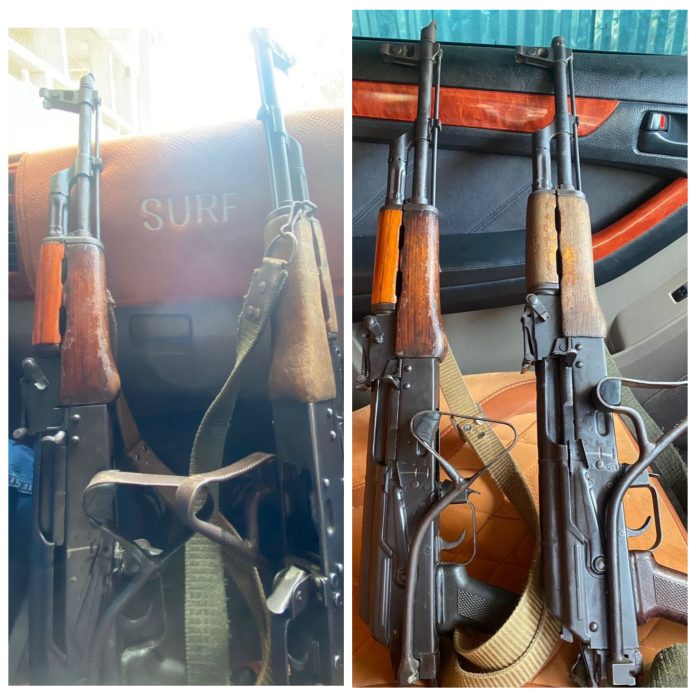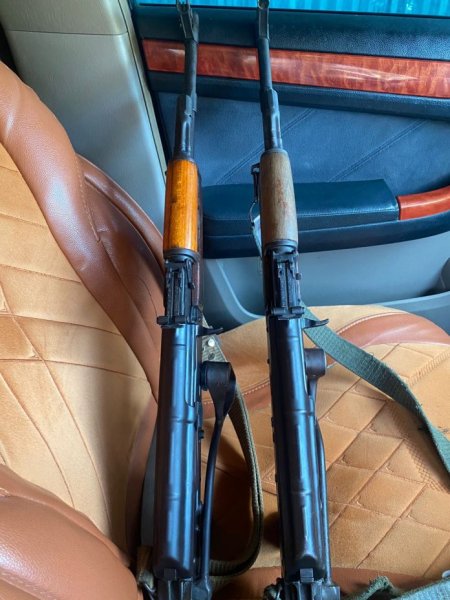
Fluctuating Fortunes: Surge in weapons supply impacts black markets in Somalia

Interviews with various sources and visits to the downtown Mogadishu arms market indicate that the black open market is now flush with an escalating volume of arms and ammunition, resulting in a rapid drop in prices.
The ramifications of this sudden supply surge are extensive. The availability of arms has prompted price reductions across various categories of guns and ammunition, a development that has caught the attention of arms dealers and those seeking to bolster their arsenals.
The primary beneficiaries of this surplus weaponry are the various militias operating within the capital, Mogadishu, as well as individuals from the central and southern regions of the country.
Interviews with arms dealers reveal a diverse clientele, ranging from tribal leaders and government-affiliated politicians to independent political figures and even businessmen.
"In Somalia, possessing a weapon is synonymous with self-defense. There exists no other reliable assurance of protection, hence the widespread adoption of armaments for personal safety,” affirmed Yusuf, an individual engaged in the sale of both light and heavy weaponry.
"For instance, we are offering new AK-47 rifles at the price of USD 1,300, while PK, a heavy machine gun commands a price of USD 13,000. The demand for weapons stems primarily from the looming specter of intertribal conflict,” Yusuf expounded.
Additionally, politicians who lack significant arms holdings, as well as prominent traders, are seeking to preempt potential threats of attack and exploitation.
The clandestine arms market, concealed within Mogadishu’s Hodan district, is experiencing an upsurge in demand. Vehicles converge on the area, with buyers keen to make swift cash transactions for firearms.

‘Cirtoogte or the shooter of the sky’
The resounding sound of gunshots echoing into the sky as a means of testing has become a commonplace routine in Mogadishu, evoking little surprise among its inhabitants.
After conducting a thorough assessment of the gun’s condition, the buyers proceed to make the payment in cash.
"This procedure ensures their confidence in the firearm’s quality,” Yusuf elaborates.
He clarifies "This practice is locally referred to as ‘Cirtoogte.” which literally translates as ‘the shooter of the sky.
This particular market serves as a notable source for arms and ammunition, catering to the needs of a wide range of consumers.
"We access weapons and ammunition from several channels, yet government soldiers constitute our most crucial source due to their reliability and trustworthiness,” explained Abdirahman, an experienced participant in the arms trade spanning two decades.
Comparing the present situation to the period before the announcement of the anti-terrorist operation, the stark drop in prices becomes evident.
While AK-47 bullets previously commanded a price of $3 in the Mogadishu market, the same ammunition is now obtainable for $0.9. This trend indicates a significant surge in both the availability and accessibility of weapons and ammunition, corroborated by insights from both Yusuf and Abdirahman.
Political and tribal rivalries continue to plague the country. President Hassan Sheikh Mohamud, re-assuming office in May 2022, vowed to prioritize the interests of the Hawiye clans, who were discontented under the rule of his predecessor Mohamed Abdullahi Farmaajo (from Daarood clans). This focus on clan-specific concerns reportedly extends to ensuring a ready supply of weapons and ammunition.
Nur Ali, an active police officer in Mogadishu, revealed a disturbing aspect of the arms influx. Apart from the weapons and ammunition being sold by government soldiers, additional weaponry is siphoned off from allocations for the ongoing offensive against Al-Shabaab on the frontlines.
Various segments of the government forces misappropriate the arms and ammunition provided to them. For instance, during operations, they requisition excessive ammunition, which often goes unused and subsequently finds its way into the arms market.
"Moreover, there are instances where weapons and ammunition meant for the military are intercepted by commanders, who then proceed to sell them on the arms market to make money,” officer Nur says.
Although the Ma’awisley militia generally does not receive directly weapons from the government, they managed to acquire a substantial quantity of AK-47 ammunition during the Hiiraan and Middle Shabelle operations last year.
Officials from the Ministry of Internal Security under the leadership of Minister Mohamed Ahmed Doodishe have acknowledged the need for a fortified system of weapon registration. However, this effort faces substantial obstacles.
"The arms registration office has become a hub for profit generation. There lacks an effective system to regulate arms and ammunition due to the involvement of high-ranking government officials and tribal militias,” stated one official at the Ministry on Internal Security requesting anonymity as he is not authorised to speak on the matter.
"Each official’s loyalty tends to be aligned with their respective clan. Consequently, we lack accurate statistics concerning the volume of illegal weaponry circulating within the country,”
In an attempt to garner insight from the Somali president’s national security adviser, Hussein Sheikh Ali, our inquiries for this story went unanswered. Similarly, the Minister of Defense, Abdulkadir Nur, declined to provide comments on the matter.
Leave a comment
- Popular
- Rated
- Commented
04/11/2021 - 11:05:02
28/05/2024 - 15:44:10
02/12/2021 - 11:34:53
01/03/2021 - 09:00:37
Opinions
18/05/2025 - 16:26:37
15/05/2025 - 20:16:04
Politics
17/04/2025 - 01:58:17
13/04/2025 - 10:59:05
Terror Watch
18/05/2025 - 00:37:46
15/05/2025 - 00:59:16
Press Releases
21/05/2025 - 01:07:28
 0
0 




































Fluctuating Fortunes: Surge in weapons supply impacts black markets in Somalia
MOGADISHU, Somalia (Horn Observer) As the government under President Hassan Sheikh Mohamud initiates a significant offensive against the militant group al-Shabaab, an unintended consequence is beginning to manifest in the form of an influx of weapon